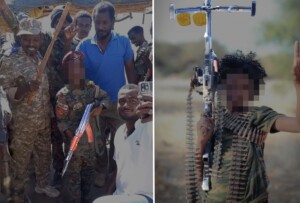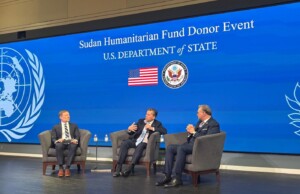Police violence at Sudan demonstrations
Thousands of demonstrators condemned the dismissal of army officers, who supported the popular uprising before the fall of President Al Bashir in April 2019, in Khartoum and other cities yesterday. The police reacted with excessive violence, using tear gas and batons.
 A protestor at yesterday's demonstration in Khartoum running with a tear gas canister (RD)
A protestor at yesterday's demonstration in Khartoum running with a tear gas canister (RD)
Thousands of demonstrators condemned the dismissal of army officers, who supported the popular uprising before the fall of President Al Bashir in April 2019, in Khartoum and other cities yesterday. The police reacted with excessive violence, using tear gas and batons.
Several demonstrators have been injured. Reports have also been received by Radio Dabanga that the police fired live ammunition into the faces of demonstrators.
Activists and journalists at the Khartoum demonstration were beaten and mobile phones confiscated. The police also confiscated the camera of Ramatan Younis and beat him.
Activists indicated that a number of protestors was arrested and held in El Shamali police station. It was not possible to verify this information.
The Sudanese Doctors Central Committee called on all the injured to go to Fedail Hospital for treatment.
Before the fall of Al Bashir the police tried to stop many demonstrations by blocking the main roads leading towards the Republican Palace and the General Command of the Armed Forces in Khartoum.

containing a tear gas canister in a bucket (RD)
'Set-back'
The Sudanese Professionals Association (SPA) condemns the brutal repression and the excessive use of violence against peaceful rallies in in the strongest possible terms. It considers it a major set-back, that shows that the current police chiefs still adhere to the same ideology as the ousted Al Bashir regime.
It calls for a swift reform of the police by removing all elements of the ousted regime, and the rehabilitation of police officers that that respect the rights of citizens and work to ensure their safety. The SPA wants the police to be put “under full supervision of a civilian executive authority”.
The SPA calls on Prime Minister Abdallah Hamdok to dismiss the Minister of the Interior, the Chief of the Police and the Chief of the Khartoum state Police.
Omar El Degeir, president of the Sudanese Congress Party, called for an investigation into the suppression of yesterday’s demonstrations.
He said in a tweet that suppressing peaceful rallies with batons and tear gas is an authoritarian practice that “is not appropriate in post-revolution Sudan”.
He demanded the authorities to organise and protect freedom of expression, not attacking it.
He brought into memory that it were peaceful rallies that brought down the Al Bashir regime and paved the way for the current transitional government.
El Degeir wants the responsible officials to be held accountable.
'The army of Sudan'
In the cities of El Gedaref and Kassala thousands of people demonstrated yesterday as well, condemning the dismissal of army officers who supported the revolution before the fall of Al Bashir.
Participants in the rally at the El Gedaref market raised banners calling for the rehabilitation of the dismissed army officers, and a restructuring of the military forces “on the basis of nationalism”. They chanted "The army is the army of Sudan, not the army of the Muslim Brothers”.
Activists in Kassala carried out a protest at the railway station, condemning the dismissal of officers, who supported the revolution in April 2019, from the armed forces.

that supported the popular uprising before the fall of ousted president Al Bashir (RD)
Radio Dabanga’s editorial independence means that we can continue to provide factual updates about political developments to Sudanese and international actors, educate people about how to avoid outbreaks of infectious diseases, and provide a window to the world for those in all corners of Sudan. Support Radio Dabanga for as little as €2.50, the equivalent of a cup of coffee.












 and then
and then